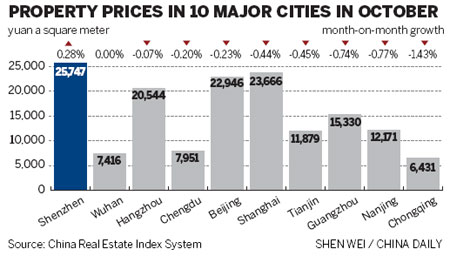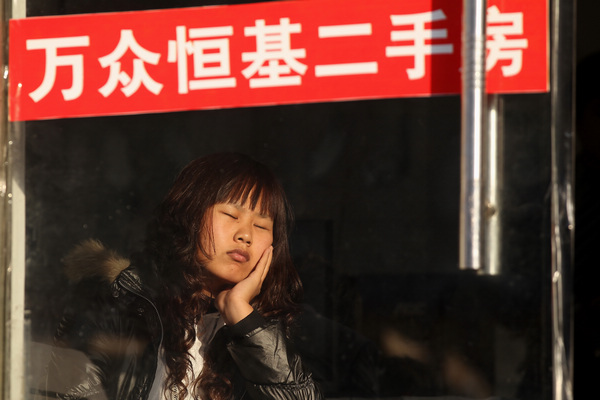Buyers and developers face some harsh home truths
Updated: 2011-11-16 08:04
By Hu Yuanyuan (China Daily)
|
|||||||||
Li Wei, a company executive in Beijing, is depressed. The value of his apartment has shrunk by nearly 500,000 yuan ($78,700) as property developers slash prices to stimulate sales.
"It took me at least four years to save the 500,000 yuan, but the money evaporated within eight months!"
Li, 30, bought a two-bedroom apartment in the capital's Tongzhou district in February at 19,800 yuan a square meter. The price now is 13,400 yuan.
His case is not unique. With more property developers suffering cash-flow problems, under the government's tightening measures, they are making wider and deeper price cuts across China's major cities.
 |
According to SouFun Holdings Ltd, owner of one of the country's biggest real estate websites, prices dropped in 58 of 100 sample cities in October, with the month-to-month decline increasing from 0.03 percent in September to 0.23 percent.
The number of cities experiencing falls also set a record for the year last month.
It is an interesting dilemma: Property developers finally reduced home prices, as the government desired, but they have felt a backlash from early homebuyers. In Beijing and Shanghai, the higher-than-expected price decline has triggered strong protests from earlier buyers, with some agitated people storming sales offices and asking for refunds.
 |
Moreover, if home prices fall too far and too fast, will the drop undermine China's economic growth?
Property investment has accounted for nearly one-fourth of fixed asset investment, and land sales remain a key source for local governments' revenue, making real estate a major driver for China's economic growth.
Expect further drops
The central government, which has shown its determination to stay the course, seems confident that it can squeeze air out of the real estate bubble while maintaining a healthy growth rate.
Premier Wen Jiabao said in late October that the government would firmly maintain control over the property market - methods have included restrictions on home purchases and bank loans - even as it seeks to fine-tune other economic policies.
"I will especially stress that there won't be the slightest wavering in China's property tightening measures. Our target is for prices to return to a reasonable level," Wen said.
The increasingly cramped cash flow has led more property developers, including such large ones as Vanke and Longfor, to cut prices by a bigger margin.
"The decline in home prices is just beginning. And this price adjustment will cut deeper than was the case in 2008 to 2009," said Chen Li, head of China equity strategy at UBS Securities. "The fluctuations in the property market, in fact, may pose the biggest challenge to China's economy next year."
According to Zhang Dawei, marketing director of Centaline Group in Beijing, price cuts will spread from the suburbs into urban areas and from large apartments to small and medium-sized ones.
"Homebuyers' confidence has hit bottom," Zhang said.
Qi Tao, a lawyer in Shanghai, had planned to buy an apartment before the end of the year for his imminent wedding, but has changed his mind. "The price may drop further in the first quarter of 2012 if the government continues those tightening measures," he said.
Enough potential buyers like Qi have decided to wait things out that sales in the third quarter, a traditional high season for real estate, were unsatisfactory.
According to the third quarter report released jointly by Knight Frank and Holdways, international real estate brokerage companies, the total area of property sold in 20 major cities fell by 17.3 percent year on year, 1.6 percent quarter on quarter.
The so-called transacted areas of new homes in Beijing dropped 18.3 percent year on year, Shanghai dropped 21.8 percent, Guangzhou 15.7 percent and Shenzhen 8.7 percent. Ten other cities showed decreases of more than 10 percent. For Chongqing and Hangzhou, declines exceeded 50 percent.
JP Morgan said in a recent research note that steeper declines may lie ahead, and prices nationally could fall 5 to 10 percent - as much as 20 percent in some major cities - over the next 12 to 18 months.
"The correction has just started, but the likelihood of a nationwide collapse is very small, as bursting the bubble is clearly not part of the policy objectives," the note said.
Thomas Lam, head of research at Knight Frank in Greater China, said that since the growth of home prices has started to become controllable, the government is unlikely to launch further new tightening policies, although current policies are not expected to be relaxed in 2012.
"We expect property prices would only slightly adjust next year, while local governments could fine-tune their policies based on the cities' individual cases," Lam said.












